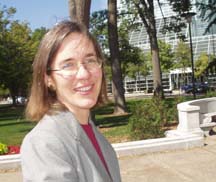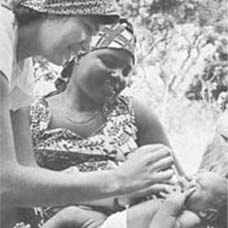
Cameroon RPCV Margaret Krome says An Interested, Involved Citizenry is Vital to Democracy
An Interested, Involved Citizenry is Vital to Democracy
by Margaret Krome
Sen. Ernest Hollings of South Carolina said this week he won't run again for the Senate, as he's discouraged by the excessively partisan and counterproductive direction of the nation's politics.
On Tuesday, Rep. Al Ott, chairman of the state Assembly's Agriculture Committee, spoke similarly of the vitriol so wrongfully injected into public discourse, tainting the process of public decision-making and public confidence in it. Concern about the health of the democratic process isn't limited to elected officials, but has cropped up in unexpected private conversations this summer.
For example, as we sewed a quilt two weeks ago, my mother shared the surprising experience of her southern Virginia women's club, which just finished a year of studying the Constitution. To her surprise, notwithstanding the club's conservative makeup and prohibition on political discussions, as club members presented papers on various aspects of the Constitution, more than once the group began discussing private concerns about President Bush's lack of respect for constitutional provisions.
They talked about his failure to give Congress the means to decide whether to declare war. It encouraged me that even in this restrained company, not one of whom I'm sure has ever attended a protest march, honest review of constitutional provisions prompted my mother's friends to discuss the health of the nation's democracy.
I spent a week cooking at my children's camp in the Virginia mountains. I wouldn't have guessed that after a sweaty morning of cooking pancakes, eggs and oatmeal my fellow cooks could summon the energy to initiate conversations about democracy. Yet, their excitement about the ways that Internet voting is opening up the presidential primary process was infectious, and several people who said they don't follow politics joined in the conversation.
A friend told me she'd been asked to run for local office but was afraid to, because she smoked marijuana years ago and thought it might be used against her. Such vulnerability isn't restricted to candidates for elected public office. The last-minute allegations - proved unfounded - against the gay Episcopal candidate for bishop, Gene Robinson, demonstrate that the power to discredit a public figure isn't only a potent secular tool.
A crucial but obscure aspect of democracy is the role of funders. A summer filled with grant writing for advocacy and grass-roots organizing reminds me how essential advocacy groups are to our democracy. Advocates help citizens organize themselves into constituencies, articulate their views, provide political pressure to advance those issues in public debate, and assemble information needed for those debates. Yet funding for their work, particularly for groups representing public rather than financial interests, is vulnerable to capricious forces.
Grants are essential sources of such funding, and grantors vary in their reliability. Whereas some stick to a predictable mission, others swing wildly, according to widely varying factors such as personal interests of foundation board members and staff, fads in philanthropic circles, fatigue in funding "the same old thing," as well as the health of stock portfolios from which private grant pools are drawn, a group's track record, and other legitimate factors.
Amazingly, the capacity to advocate on issues that may affect millions of people is often left to the decisions of a very few, accountable to themselves. Some advocacy group leaders I've talked with this summer are distraught with the limbo in which their issues are trapped.
I don't know whether suddenly I'm hearing more talk about democracy because I'm listening better, or prompting it. But if the clearest essential for a vigorous democracy is a citizenry that cares, I'd rather think that my conversations are signs of a nation rousing itself in defense of democratic traditions and institutions.
Margaret Krome of Madison writes a twice-monthly column for The Capital Times.
Copyright 2003 The Capital Times








